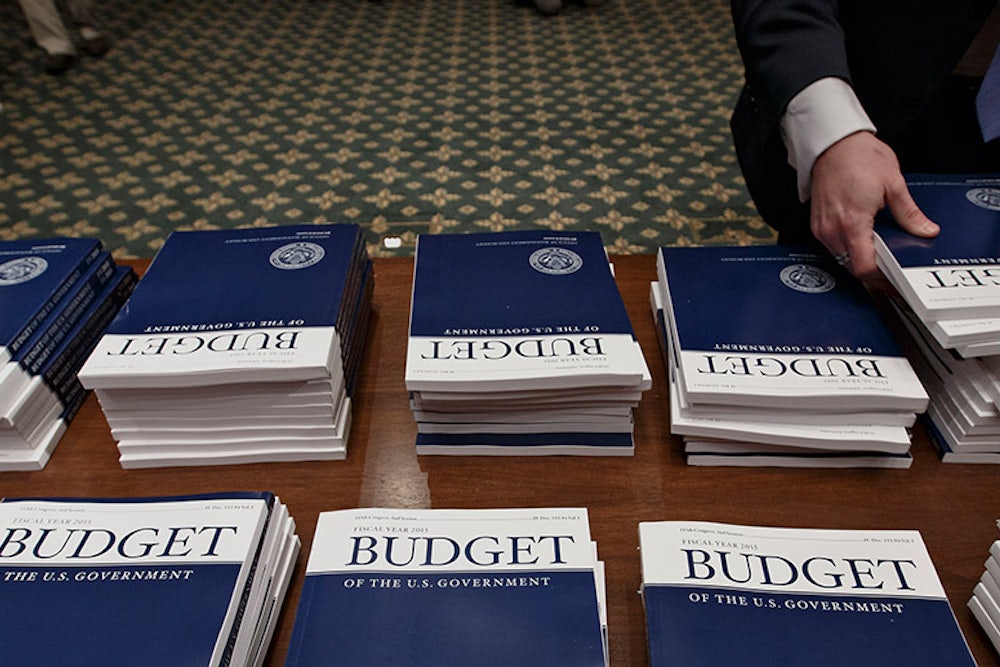Mere hours after the White House released President Obama’s budget, Washington had reached a consensus about it: It's “irrelevant.”
As this argument goes, the House and Senate have already agreed on a fiscal policy plan—the agreement from House Budget Chairman Paul Ryan and Senate Budget Chairman Patty Murray that Congress passed in the fall. Ryan-Murray lays out the basic parameters of what the government will take in and spend, not just for 2014 but also for 2015. Neither party wants to revisit that pact. And to the extent Obama is proposing new ideas for the long term, like pouring money into early childhood education, the Republicans simply aren’t interested in passing them. That would seem to render Obama’s new budget an exercise in pure political symbolism, and maybe empty symbolism at that.
I take a different view—and not simply because I’m nerdy enough to think of reading 200-plus pages of figures and charts as an opportunity, rather than a burden. For one thing, some of Obama’s budget proposals could still become legislation—not as sweeping initiatives, for sure, but as scaled-down pilots or add-ons to other pieces of legislation. It’s already happened once, in the Ryan-Murray spending agreement. Mostly that pact was about restoring some of the funding that various federal agencies had lost, because of budget sequestration. But the Administration and its Capitol Hill allies managed to squeeze out a little extra funding for early childhood programs. One reason: Obama’s call for a massive, $75 billion investment in the previous year’s budget put the issue onto the agenda.
The Administration may have another chance to scrounge up new funding for early childhood this year, now that leaders in both parties have expressed interest in reauthorizing and improving the Child Care and Development Block Grant, which is the federal government’s biggest program for financing day care. And that’s not the only pending legislation that could give the Administration and its allies a chance to fight for funds. Congress could to take up a major highway bill, since the existing federal law expires in September. That’s an opportunity to drum up support for infrastructure projects, which include ports that need dredging as well as roads that need building.
“We can’t simply throw up our hands and not pass a highway bill,” one senior administration official said on Tuesday. And while this particular Congress has shown an unusual proclivity for doing nothing, thanks mostly to Republican intransigence, the two parties seem to have some of the same topics on their minds. Both Ryan and Senator Marco Rubio has expressed interest in expanding the Earned Income Tax Credit, so that childless adults can get benefits closer to the ones that families already receive. Obama’s budget calls for the same thing. House Ways and Means Chairman Dave Camp has talked about closing corporate tax loopholes, bolstering tax breaks for the working poor, and even throwing a little funding at infrastructure. Obama’s budget includes versions of all of these.
The parties are still far apart—very, very far apart—on the specifics. Republicans and Democrats have fundamental disagreements about how to fund highway creation and maintenance, with one side supporting new taxes and the other favoring tax cuts. (You can guess who wants what.) The Republican EITC proposals would give more money to childless adults by giving less money to families; Obama’s proposal would increase funding across the board. But particularly when it comes to some of the provisions of Camp’s tax plan, a senior administration official said on Tuesday, “there’s basis for a serious conversation.”
Of course, Camp isn't the problem. It's the House Republican leaders, who are in no rush to put his plan—or anybody else's plan—on the agenda if they can avoid it. That’s partly because an election is coming up. Republicans figure they will pick up seats in the midterms, giving them more leverage over any fiscal negotiations taking place. But a budget unlikely to generate legislation can still have meaning, as a statement of priorities. In this case, the Obama budget is a preview of the agenda Democrats will adopt whenever full-scale fiscal negotiations start up again—which, as Bob Greenstein of the Center on Budget and Policy Priorities points out, is likely to happen sometime in 2015:
2014 likely won’t be a year of significant budgetary action beyond the appropriations bills. But 2015 may well be. Policymakers likely will seek to negotiate another budget deal to ease the scheduled sequestration budget cuts for 2016 and beyond and also may consider tax reform and other measures. Both the new Obama budget and the budget proposal that House Budget Committee Chair Paul Ryan will unveil in a few weeks will offer dueling frameworks for a year-long debate on where fiscal and program policy should go, in advance of larger decisions next year.
That's precisely the sort of information voters should have in November, when they decide which parties control the two houses of Congress.
The stakes in the fall may not be nearly as big as they were in 2008, when Obama was promising to reform health care and stop climate change—or in 2010, when Republicans were vowing to roll back Obama’s accomplishments and, then, roll back parts of the Great Society and New Deal. But those were unusually grandiose times. The difference between Democratic and Republican visions of government are still large—and in 2015, when the current spending agreement runs out, lawmakers will have to reconcile them. Obama’s budget is one vision for how to do that, which makes it worth taking seriously.
